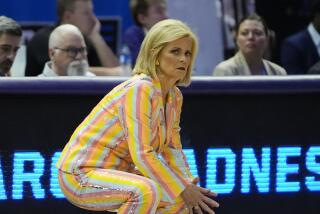She’s ‘the Best Player in College--No Question’ : Stanford’s Patty Fendick Appears Ready to Defend Her NCAA Tennis Title
- Share via
Just when Stanford tennis player Patty Fendick had solved the weighty problem of the moment--herself--the real trouble began last spring.
That’s when everyone else in her life decided to solve Patty Fendick once and for all.
Despite her protests, her coach, Frank Brennan, decided professional help was the answer.
“He tried to send me to a psychiatrist,” Fendick said, laughing. That proved to be more of a problem than solving the mystery of USC rival Caroline Kuhlman’s tennis game.
Fendick already had realized how much she was hurting herself, and her game, with her poor on-court attitude. So she took a short break from tennis and a long spell of self-examination. Then hitting forehands and serves suddenly became fun again.
But . . .
“He (Brennan) was so worried about me,” Fendick recalled in April. “He thought I was going to get an ulcer.”
So, Brennan dragged her--not kicking and screaming, but close--to the first meeting with a psychiatrist. But they couldn’t drag more than one-or two-word answers out of her. Fendick remembers that Brennan kept nudging her while she cracked up with teammate Cari Hagey, who came along at Fendick’s insistance.
“It was a joke,” Fendick said. “She (the psychiatrist) wanted to talk to me about my childhood, my parents, my brothers . . . do they feel jealous of me?
“I didn’t want to deal with this. Then, they try to give you this guilt trip--’Since you’re not participating, you don’t want to do anything about your problems.’ ”
The first visit was the last. When Brennan asked, “Are you keeping the appointments?” Fendick answered, “Yes.”
It was the truth. Sort of.
“Cari Hagey went in my place . . . she had a few problems,” Fendick said, joking.
Once Brennan finally learned Fendick’s new-and-improved attitude did not result from the visits to the psychiatrist, it was too late for him to get angry.
Fendick had helped the Cardinal win the NCAA team title last May and, a few days later, she had won the singles championship. In all, Fendick lost just one set in six matches during the individual phase.
Now, this year, as fourth-seeded Stanford prepares to defend its title--meeting No. 13 USC today in a first-round match at UCLA’s L.A. Tennis Center--Fendick has assumed the role of team leader.
“Patty is the best player in college,” said Bill Zaima, coach of fifth-seeded UCLA. “There’s no question about it. She’s going to come into the NCAA’s and no one can touch her. Patty has matured so much as a player, and now she has great poise as well as ability.
“She’s had a great year and has lost just one set. And she’s been putting it on the line every match.”
Some observers felt Fendick would be putting it on the line elsewhere--on the women’s professional circuit this year. Speculation increased after she reached the third round of singles and the doubles semifinals at Wimbledon last June. Fendick and Florida’s Jill Hetherington upset the formidable team of Helena Sukova and Claudia Kohde-Kilsch before losing to Hana Mandlikova and Wendy Turnbull in three sets.
However, Fendick knew differently. She wasn’t about to give up on her dream of obtaining a Stanford degree, especially just one year shy of the goal. Then when No. 3 singles player Marianne Werdel opted to turn pro shortly before school started last fall, Fendick banished all thoughts of leaving Palo Alto from her mind.
“If I did it (turn pro) and with Marianne leaving, that would have devastated our program,” said Fendick, who is ranked No. 82 in the world. “I needed more personal growth, and I didn’t feel I was ready. I love my teammates and I didn’t want to duck out on them.”
From time to time, though, Fendick caught herself wondering whether staying in college might slow her progress. In addition, it hasn’t been easy for her to turn away more than $90,000 in prize money.
The lack of competition was also a factor because Kuhlman, the only player capable of really testing her, was relegated to the sideline because of chronic knee injuries.
When Kuhlman was playing, she came close to stopping Fendick’s unbeaten streak at the National Collegiate Tennis tournament in Cathedral City in January. Kuhlman held a handful of match points before Fendick prevailed, 6-1, 3-6, 7-5. That was the closest anyone has come to Fendick in 30 matches this season.
“Looking back, at the first part of the year, I thought, ‘Maybe I shouldn’t be doing this,’ ” Fendick said. “Then, Caroline’s injury was the most depressing news I had all year. I love to play against Caroline and it had developed into a fun rivalry. I’d get excited about the matches.
“You hate to see that happen to your worst enemy much less than to someone you respect.”
So, in order to receive a true test of her improved game, Fendick played in two professional tournaments in February. At the Virginia Slims of California, she lost to tenth-ranked Kathy Rinaldi, 4-6, 7-5, 6-0, in the first round.
A week later, she won two matches at the Virginia Slims of Florida, defeating Lisa Bonder and Halle Cioffi. In the third round against fifth-ranked Sukova, Fendick had an advantage for a 6-5 lead in the third set before losing, 3-6, 6-0, 7-5.
“I made one bad decision on my ad that cost me the match,” Fendick said. “I wasn’t playing that well, but I was pretty happy the way I managed to hang in there. If I had played two percent better, I would have won the match.”
Fendick shrugged. Despite the disappointment, the loss to Sukova gave her added confidence for her NCAA title defense.
And for when she turns pro shortly afterward.
More to Read
Go beyond the scoreboard
Get the latest on L.A.'s teams in the daily Sports Report newsletter.
You may occasionally receive promotional content from the Los Angeles Times.











